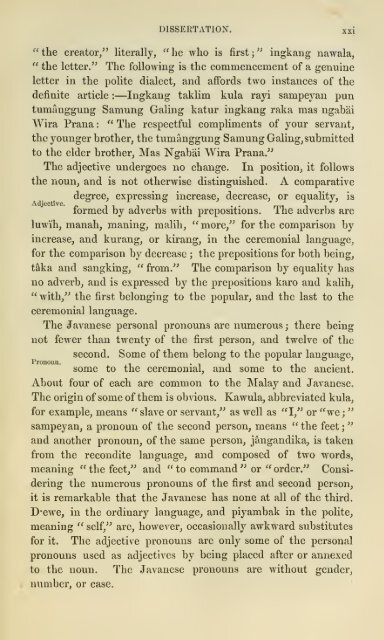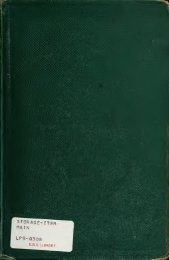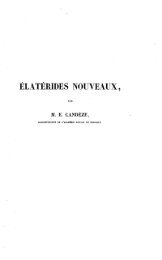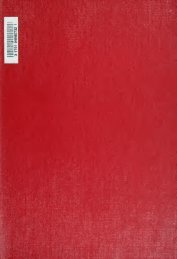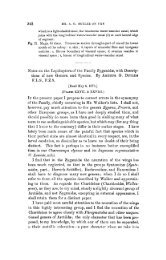- Page 2: Oa^i«^/Vii^j. ( .(fc
- Page 7 and 8: : GRAMMAR AND DICTIONARY MALAY LANG
- Page 9: THE BARON ALEXANDER VON HUMBOLDT Si
- Page 12 and 13: viii TREPACE. Mr. Marsdeiij my book
- Page 15 and 16: A DISSERTATION AFFINITIES OF THE MA
- Page 17 and 18: DISSERTATION. iii history refute th
- Page 19 and 20: DISSERTATION. V the ideas which the
- Page 21 and 22: DISSEETATION. vii they contain, jus
- Page 23 and 24: DISSERTATION. ix this kind of circu
- Page 25 and 26: — DISSERTATION. xi fetta. Magella
- Page 27 and 28: ; DISSERTATION. xiii An examination
- Page 29 and 30: ' DISSERTATION. xv sabtu, "Saturday
- Page 31 and 32: — DISSEKTATION-. XvU inherent vow
- Page 33: DISSERTATION. lix ABBREVIATIONS OF
- Page 37 and 38: ; DISSERTATION. xxiii Javanese anab
- Page 39 and 40: ; DISSERTATION. xxv for the ordinar
- Page 41 and 42: DISSERTATION. xxvii ; sdsaton, " wi
- Page 45 and 46: — DISSERTATION. xxxi the permutat
- Page 49 and 50: DISSERTATION, VULGAR. Tagal. Samara
- Page 51 and 52: DISSERTATION. xxxvii usually stated
- Page 53 and 54: — DISSERTATION. xxxix easily inte
- Page 55 and 56: "; DISSERTATION. xli letter of the
- Page 57 and 58: DISSERTATION, xliii as Sumeru, the
- Page 59 and 60: ; DTSSEKTATION. xlv the Archipelago
- Page 61 and 62: ; DISSEETATIOX. xlvii come along, a
- Page 63 and 64: DISSERTATION. xlix had also settlem
- Page 65: DISSERTATION. time ai'e sudah, tala
- Page 69 and 70: " DISSERTATION. sinjang, " cloth ;
- Page 71 and 72: ; ; "; DISSERTATION. Ivii The ordin
- Page 73 and 74: DISSEKTATION. Ijx It Avould be curi
- Page 75 and 76: DISSERTATIOX, l^^i The only specime
- Page 77 and 78: — — DISSERTATION. Ixiii for the
- Page 79 and 80: DISSERTATION. Ixv case, which is fo
- Page 81 and 82: DISSERTATION. Ixvii therefore, in o
- Page 83 and 84: ; DISSERTATION. Ixix relation are n
- Page 85 and 86:
; DISSERTATION. Ixxi :— are in th
- Page 87 and 88:
DISSERTATION, Ixxiil rous. For the
- Page 89 and 90:
— DISSERTATION. Ixxv MADURESE. El
- Page 91 and 92:
DISSERTATION. hxvii words are forei
- Page 93 and 94:
; DISSERTATION. Ixxix three letters
- Page 95 and 96:
; ; ; DISSERTATION. Ixxxi " here "
- Page 97 and 98:
DTSSERTATIOX. Ixxxiii themselves in
- Page 99 and 100:
^ DISSERTATION. hxxv advanced of th
- Page 101 and 102:
— DISSERTATION, Ixxxvii vowel o,
- Page 103 and 104:
BUGIS.
- Page 105 and 106:
DISSERTATION. xci Bugis prouuuciati
- Page 107 and 108:
— DISSERTATION. xciii guages, the
- Page 109 and 110:
— DISSERTATION. xcv Judging by th
- Page 111 and 112:
DISSERTATION. xcvii much larger tha
- Page 113 and 114:
ENGLISH. DISSEKTATION.
- Page 115 and 116:
— DISSERTATION. ci particles diff
- Page 117 and 118:
DISSERTATION. ciii considerable adv
- Page 119 and 120:
DISSERTATION. CT voyages extended n
- Page 121 and 122:
DISSEETATION. cvii each, and which
- Page 123 and 124:
DISSERTATION, cix prefix one which
- Page 125 and 126:
DISSERTATION. cxi for its genitive
- Page 127 and 128:
DISSERTATION. cxiii inaralan ; plup
- Page 129 and 130:
— DISSERTATION. CXT Tagala or Bis
- Page 131 and 132:
— DISSERTATION. cxvii The same co
- Page 134 and 135:
— cxx DISSERTATION. more in concr
- Page 136 and 137:
cxxii DISSERTATION. 25 of these wor
- Page 138:
cxxiv
- Page 141 and 142:
— DISSERTATION. cxxvii western pa
- Page 143 and 144:
DISSERTATIOX. c.Txix of his theory.
- Page 145 and 146:
; — DISSERTATION. exxxi is coarse
- Page 148 and 149:
cxxxiv DISSERTATION. several words
- Page 150 and 151:
cxxxvi DISSERTATION. but no observe
- Page 152 and 153:
cxxxviii DISSERTATION. is formed by
- Page 154:
cx\
- Page 157 and 158:
— DISSERTATION. cxli the changes
- Page 159 and 160:
— DISSERTATION. cxlv islands, or
- Page 161 and 162:
" than three which are ISIalayan, m
- Page 163 and 164:
DISSERTATION. cxHx in the Negro ; l
- Page 165 and 166:
DISSERTATION. cli of which it is h.
- Page 167 and 168:
DISSERTATION, cliii MALAGASI.
- Page 169 and 170:
MALAGASI. DISSERTATION.
- Page 171 and 172:
DISSERTATION. clvii although, by vi
- Page 173 and 174:
; DISSERTATION. clix Polynesia. The
- Page 175 and 176:
DISSERTATION. clxi many miglit be c
- Page 177 and 178:
DISSERTATION. clxiiiparts also of t
- Page 179 and 180:
DISSERTATION. ckv African Negro. Th
- Page 181 and 182:
— DISSERTATION. clxvii Proceeding
- Page 183 and 184:
— DISSERTATION. clxix On the auth
- Page 185 and 186:
i -a 1 II 1 i ^ M I I .^ . i =^ I ^
- Page 187 and 188:
DISSERTATION. clxxiii The conclusio
- Page 189 and 190:
DISSERTATION. clxxv and their conso
- Page 191 and 192:
J DISSERTATION. clxxvii is to the s
- Page 193 and 194:
; DISSERTATION. clxxix eighteen ver
- Page 195 and 196:
DISSERTATION. clxxxi Boripar, and Y
- Page 197 and 198:
— — DISSERTATION. clxx.\ui I pr
- Page 200 and 201:
clxx
- Page 202:
cl>IxxxviH
- Page 205 and 206:
DISSERTATION. cxci The names given
- Page 208 and 209:
• ; cxeiv DISSERTATION. of iron o
- Page 210 and 211:
— cxcvi DISSERTATION. The Malay a
- Page 212 and 213:
cxcviii DISSEETATION. prevalence of
- Page 214 and 215:
cc DISSEKTATION. ENGLISH. MALAY. JA
- Page 217:
DISSERTATION. coiii and "princess."
- Page 220 and 221:
— ccvi DISSEETATION. tliem, and t
- Page 222:
— ccviii DISSERTATION. name for t
- Page 227 and 228:
— DISSERTATION. ccxiii not belong
- Page 229 and 230:
— DISSERTATION. ccxv 'riie cultiv
- Page 231 and 232:
— DISSERTATION. cc.wii The influe
- Page 233 and 234:
ut DISSERTATION. ccxix The first fi
- Page 235 and 236:
— DISSERTATION". ccxxi Malayan, a
- Page 237 and 238:
— DISSERTATION. ccxxiii Two langu
- Page 239 and 240:
ENGLISH.
- Page 241 and 242:
— DISSERTATION. ccxxvii tlie Mala
- Page 244:
— DISSERTATION. barley (?), and t
- Page 247 and 248:
— DISSERTATION, ccxxxiii Of this
- Page 250 and 251:
— ccxxxvi DISSERTATION. referring
- Page 252 and 253:
ccxxxviii
- Page 254 and 255:
— ccxl DISSERTATION. in 1000 of t
- Page 256 and 257:
— ccxlii DISSERTATION. Pacific is
- Page 258 and 259:
— cexliv DISSERTATION. two synony
- Page 260 and 261:
ccxl'vi DISSERTATION. west, and ext
- Page 262 and 263:
ccxlvlii DISSERTATION. inhabitants.
- Page 264 and 265:
ccl DISSERTATION. Thin, sleuder.
- Page 266 and 267:
; cclii DISSERTATION. less intermix
- Page 268 and 269:
ccliv DISSERTATION. lying between t
- Page 270 and 271:
cclvi BISSERTATIOX. that the migrat
- Page 272 and 273:
cclvlii DISSERTATION. account, that
- Page 274 and 275:
cclx DISSERTATION. immigration." *
- Page 276 and 277:
" DISSEETATION. " thousand," are ex
- Page 278 and 279:
— cclxiv DISSERTATION. au example
- Page 280 and 281:
— cclxvi DISSEETATION. into Madag
- Page 282 and 283:
— cclxviii DISSERTATION. also, bo
- Page 284 and 285:
— cclxx DISSEETATION. " pepper fr
- Page 286 and 287:
— cclxxii DISSERTATION, expected,
- Page 288 and 289:
— ccl.x DISSERTATION. Among the c
- Page 290 and 291:
cclxxvi DISSERTATION. be added. In
- Page 292 and 293:
cclxxvlii DISSERTATION. the assista
- Page 294 and 295:
; cclxxx DISSERTATION. by the arriv
- Page 296 and 297:
cclxxxii DISSERTATION. ornamental m
- Page 298 and 299:
cclxxxiv DISSERTATION. It may be ob
- Page 300 and 301:
cclxxxvi DISSERTATION. termed provi
- Page 302 and 303:
; cclxxxviii DISSERTATION. and neve
- Page 304 and 305:
ccxc DISSERTATION. persons under Li
- Page 307 and 308:
A GRAMMAR THE MALAY LANGUAGE. ORTHO
- Page 309 and 310:
ORTHOGKAPHY. 3 distinct character f
- Page 311 and 312:
— OKTHOGEAPHY. 5 by Roman letters
- Page 313 and 314:
; ab t PEONUNCIATION. 7 LETTERS OF
- Page 315 and 316:
; PARTS OF SPEECH. 9 the k is elide
- Page 317 and 318:
; NOUN. 11- rang buiiga ini; tarlal
- Page 319 and 320:
— ; NOUN. 13 balakang, balik, sus
- Page 321 and 322:
NOUN. lo D^ri may be rendered in En
- Page 323 and 324:
NOLTN. 17 Antara and the two next p
- Page 325 and 326:
— ; NOUN. 19 naga makutaiia darip
- Page 327 and 328:
; ; ADJECTIVE. 21 chantik, molek ;
- Page 329 and 330:
NUMERALS. 23 the system of numerati
- Page 331 and 332:
; PRONOUNS. 25 are used only in add
- Page 333 and 334:
— ; PEONOUNS. 27 To the personal
- Page 335 and 336:
; VERB. 29 the summit of the island
- Page 337 and 338:
; VERB. 31 Transitive Verb.—A tra
- Page 339 and 340:
VERB. 33 suwaraiia, sapurti buhih p
- Page 341 and 342:
VERB. 35 as to a radical, by the af
- Page 343 and 344:
VERB. 37 and the nasal ng substitut
- Page 345 and 346:
VEKB. 59 from labuh, to anchor, par
- Page 347 and 348:
VEK13. 4L miuer, aud also, a diggin
- Page 349 and 350:
— — — ; VERB. 4.;} words of t
- Page 351 and 352:
; VERB. 45 saudarafia, utus-mangutu
- Page 353 and 354:
VERB. ^T not easy to understand. Ji
- Page 355 and 356:
Sakutika barwayang, a^-ampun barkuk
- Page 357 and 358:
. ; — VERB. 51 Saorftng p^rampiia
- Page 359 and 360:
VERB. 53 affix kan may be the prepo
- Page 361 and 362:
; generally some reference to an an
- Page 363 and 364:
; KEDUFLlCATIOiS\ 57 constant occur
- Page 365 and 366:
— SYNTAX. 59 The object follows t
- Page 367 and 368:
; PROSODY. 61 PROSODY. The Malay la
- Page 369 and 370:
— — MISCELLANEOUS REMAEKS. 63 c
- Page 371 and 372:
; MISCELLANEOUS REMARKS. Go speech
- Page 373 and 374:
MISCELLANEOUS REMARKS. 67 Indian is
- Page 375 and 376:
; MlSCELLAiSEoUS REMARKS. 69 very c
- Page 377 and 378:
;; IDIOMS. 71 sister ; ayah and aya
- Page 379 and 380:
; HISTORY UF THE LANGUAGE. 73 the p
- Page 381 and 382:
DlALEGTSc 75 arisen^ more from the
- Page 383 and 384:
LITER ATUKR. 77 author. All Malay l
- Page 385 and 386:
; LITERATURE. 79 like that of a ros
- Page 387 and 388:
LITERATURE. 81 all drank, pledging
- Page 389 and 390:
— ; — — ; — ; — — LITER


